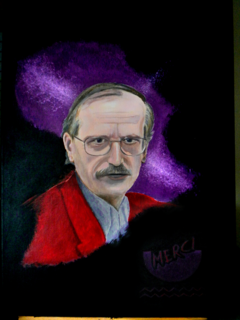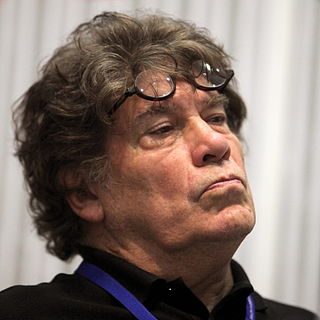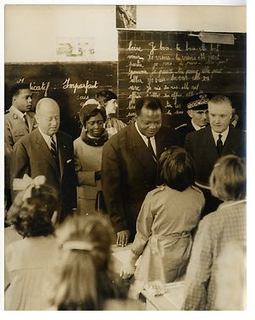
The CFA franc is the name of two currencies, the West African CFA franc, used in eight West African countries, and the Central African CFA franc, used in six Central African countries. Although separate, the two CFA franc currencies have always been at parity and are effectively interchangeable. The ISO currency codes are XAF for the Central African CFA franc and XOF for the West African CFA franc. On 22 December 2019, it was announced that the West African currency would be replaced by an independent currency to be called Eco.

Willem Werner Hubert "Willy" Claes is a Belgian politician who served as the eighth Secretary General of NATO, from 1994 to 1995. Claes was forced to resign from his NATO position after he was found guilty of corruption, which was uncovered during the investigation into André Cools' death. Claes was a member of the Flemish Socialist Party.

The Rwandan genocide occurred between 7 April and 15 July 1994 during the Rwandan Civil War. During this period of around 100 days, members of the Tutsi minority ethnic group, as well as some moderate Hutu and Twa, were slaughtered by armed militias. The most widely accepted scholarly estimates are around 500,000 to 800,000 Tutsi deaths.

The failure of the international community to effectively respond to the Rwandan genocide of 1994 has been the subject of significant criticism. During a period of around 100 days, between 7 April and 15 July, an estimated 500,000-1,100,000 Rwandans, mostly Tutsi and moderate Hutu, were murdered by Interahamwe militias.
Each "article" in this category is a collection of entries about several stamp issuers, presented in alphabetical order. The entries are formulated on the micro model and so provide summary information about all known issuers.

François-Xavier Verschave was primarily known as one of the founders of the French NGO Survie ("Survival"), over which he presided since 1995, and as coiner of the term Françafrique, an expression for a specific type of neocolonialism which has been imposed upon the former colonies of the French Empire by France.

Pierre Péan was a French investigative journalist and author of many books concerned with political scandals.

Jacques Foccart was a French businessman and politician, best known as a chief adviser to French presidents on African affairs. He was also a co-founder of the Gaullist Service d'Action Civique (SAC) in 1959 with Charles Pasqua, which specialized in covert operations in Africa.

In international relations, Françafrique is France's sphere of influence over former French and Belgian colonies in sub-Saharan Africa. The term was derived from the expression France-Afrique, which was used by the first president of Ivory Coast, Félix Houphouët-Boigny, in 1955 to describe his country's close ties with France. It was later renamed Françafrique by François-Xavier Verschave in 1998 to criticise the alleged corrupt and clandestine activities of various Franco-African political, economic and military networks.
Events from the year 1945 in France.
François-Xavier is a French masculine given name. Notable people with the name include:

The role of France in the Rwandan genocide of 1994 has been a source of controversy and debate both within and beyond France and Rwanda. France actively supported the Hutu-led government of Juvénal Habyarimana against the Tutsi-dominated Rwandan Patriotic Front, which since 1990 had been engaged in a conflict intended to restore the rights of Rwandan Tutsis both within Rwanda and exiled in neighboring countries following over four decades of anti-Tutsi violence. France provided arms and military training to Habyarimana's militias, the Interahamwe and Impuzamugambi, which were among the government's primary means of operationalizing the genocide following the assassination of Juvénal Habyarimana and Cyprien Ntaryamira on April 6, 1994.
Kizito Mihigo was a Rwandan gospel singer, songwriter, organist, composer of sacred music, television presenter, genocide survivor, and peace and reconciliation activist. Kizito was an iconic activist who dedicated his life to healing the souls of his fellow genocide survivors and rebuilding unity and reconciliation in Rwanda. According to Kisito's words, published on Kizitomihigo.com, he claimed, "The objective of my works is to console and strengthen the wounded hearts, singing peace and forgiveness." His ultimate performance in healing and Peacebuilding started in 2010 when he created the Kizito Mihigo Peace Foundation, a non-profit organization devoted to his cause.
Rose Mukantabana is a lawyer and women's rights activist. She is the former President of the Chamber of Deputies of Rwanda and was the first woman elected to the post. She was elected to serve as chair of the African Parliamentary Union from 2013-2015.

The 2018 Nobel Peace Prize was awarded to Denis Mukwege and Nadia Murad "for their efforts to end the use of sexual violence as a weapon of war and armed conflict," according to the Norwegian Nobel Committee announcement on 5 October 2018 in Oslo, Norway. "Both laureates have made a crucial contribution to focusing attention on, and combating, such war crimes," according to the award citation. After reading the citation, Committee Chair Berit Reiss-Andersen told reporters that the impact of this year's award is to highlight sexual abuse with the goal that every level of governance take responsibility to end such crimes and impunities.

Massacres of Hutus during the First Congo War refers to the mass killing of Rwandan, Congolese, and Burundian Hutu men, women, and children in villages and refugee camps then hunted down while fleeing across the territory of Democratic Republic of Congo from October 1996 to May 1997.

The Ikiza or the Ubwicanyi (Killings) was a series of mass killings—often characterised as a genocide—which were committed in Burundi in 1972 by the Tutsi-dominated army and government, primarily against educated and elite Hutus who lived in the country. Conservative estimates place the death toll of the event between 100,000 and 150,000 killed, while some estimates of the death toll go as high as 300,000.

Rwanda–Spain relations are the bilateral and diplomatic relations between these two countries. Rwanda does not have an embassy in Spain, however its embassy in Paris, France, is accredited to Spain and maintains an honorary consulate in Madrid. Spain does not have an embassy in Rwanda, however, its embassy in Dar es Salaam, Tanzania, is accredited to Rwanda and maintains an honorary consulate in Kigali.
The following lists events that happened during 2020 in East Africa. The countries listed are those described in the United Nations geoscheme for East Africa: Burundi, Comoros, Djibouti, Eritrea, Ethiopia, Kenya, Madagascar, Malawi, Mauritius, Mayotte, Mozambique, Réunion, Rwanda, Seychelles, Somalia, South Sudan, Tanzania, Uganda, Zambia, Zimbabwe.

Belgium-Rwanda relations refers to the international and diplomatic relations between Belgium and Rwanda. Belgian relations with Rwanda started under the League of Nations mandate, when the modern day countries of Rwanda and Burundi were governed as Ruanda-Urundi. As the colonial power, Rwanda's relationship with Belgium has been significant throughout the country's history, even after independence.












